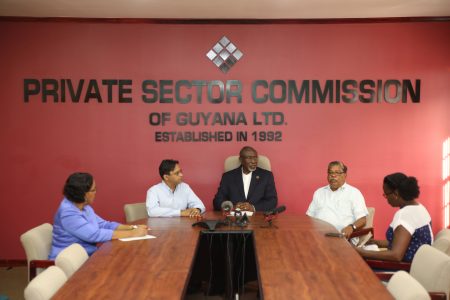While the Civil Defence Commission (CDC) yesterday received roughly $7 million in relief supplies from the private sector to assist those countries affected by the passage of the recent hurricanes, getting them to those in need has become a problem, CDC Director Colonel Chabilall Ramsarup said yesterday.
Ramsarup, during a press briefing where a donation was made by the Private Sector Commission (PSC), related that the two aircrafts that were thought to be available to aid the delivery will no longer be able to facilitate the movement of the cargo.
Minister of State Joseph Harmon had told reporters on Thursday, during a post-Cabinet press briefing, that the British High Commission was collaborating with the government to make a C-130 aircraft available to move the supplies, and even provide a second aircraft if necessary.

“We have one little problem and that is the moving of the stuff. We anticipated that we would have had two C-130 planes… this afternoon I was told that they can’t loan us the aircraft for the purpose of moving the supplies… You know that if we take another two weeks to get the stuff there, it does not mean anything to them. The fastest you get the humanitarian assistance is always best in a disaster. It can save lives. It can prevent illnesses and so on,” Ramsarup stated.
He related that a member of the private sector had promised to lend a boat to transport the items, but said that fuel would have to be supplied. Ramsarup said that they are working “feverishly” to acquire the fuel, and noted that they are hoping to be able to deliver the supplies by the middle of next week.
When asked why the planes will no longer be available, Ramsarup said he was unaware of the reason. However, Stabroek News was told that there are diplomatic processes that are usually followed prior to making public statements on commitments made by other nations, and it remains unclear whether the British government actually approved the government’s request.
“You guys would understand that logistics is always a problem,” Desmond Sears, Vice-Chairman of the PSC, stated yesterday.
“But the point at this time is to get those supplies to the islands. So we’re asking that persons who can assist in transportation, come on board. You can contact the Civil Defence Commission, or you can come through the private sector commission,” he added.
On Thursday, Harmon announced that he had been in contact with the British High Commission, and it was “confirmed” that efforts had been made to make the aircrafts available, and the relevant counterparts had agreed.
“Through the collaborative efforts of the British High Commission in Guyana and the Ministry of Foreign Affairs, we have been able to take steps to have a British Military aircraft—a C-130—based in Barbados. We have had that facilitation done by the British High Commission, who, a few minutes ago, just before I came here, confirmed that he had been in touch with his colleagues, and they’ve agreed to have a C-130 aircraft come to Guyana to pick up items that are needed,” Harmon said on Thursday.
“We have at this point in time about 10 containers worth of building material, food stuff, and medical supplies, which I understand will be taken from here to Antigua which is going to be the hub as identified by CDEMA [Caribbean Disaster Emergency Management Agency] and from that point it will be taken to the various territories that are affected. The High Commissioner, I believe, has been very happy to extend this facility as these aircrafts are on the ground in Barbados and they are awaiting to be tasked,” he continued.
On Sunday, the CDC sent a planeload of supplies, including water, food, hygiene kits, medical supplies and a generator, to Antigua for distribution. The aircraft was sponsored by Komal Singh, of Gaico Construction.
Earlier this week, Ramsarup had told this newspaper that the CDC, with support from the Ministry of Health and other ministries and the Private Sector Commission, plans to send 10 containers to Antigua to be distributed to affected territories through the CDEMA.




